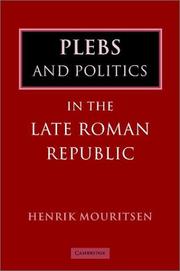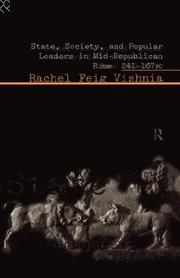| Listing 1 - 10 of 18 | << page >> |
Sort by
|
Book
ISBN: 3774916500 Year: 1979 Publisher: Bonn Habelt
Abstract | Keywords | Export | Availability | Bookmark
 Loading...
Loading...Choose an application
- Reference Manager
- EndNote
- RefWorks (Direct export to RefWorks)
Plebs (Rome) --- Plèbe --- Commons (Social order) --- Estates (Social orders) --- Patron and client --- Proletariat --- Rome --- Politics and government --- -Plebs (Rome) --- -Plebs (Rome). --- Plebs (Rome). --- Plèbe
Book
Year: 1969 Publisher: Oxford : Clarendon press,
Abstract | Keywords | Export | Availability | Bookmark
 Loading...
Loading...Choose an application
- Reference Manager
- EndNote
- RefWorks (Direct export to RefWorks)
Plebs (Rome) --- Emperors --- Plèbe --- Empereurs
Book
Year: 1969 Publisher: Berlin, Akademie-Verlag,
Abstract | Keywords | Export | Availability | Bookmark
 Loading...
Loading...Choose an application
- Reference Manager
- EndNote
- RefWorks (Direct export to RefWorks)
Plebs (Rome) --- Plèbe --- Rome --- Histoire --- History
Book
Year: 1909 Publisher: Leipzig : A. Deichert,
Abstract | Keywords | Export | Availability | Bookmark
 Loading...
Loading...Choose an application
- Reference Manager
- EndNote
- RefWorks (Direct export to RefWorks)
Plebs (Rome) --- Roman law --- Plèbe --- Droit romain --- History --- Histoire
Book
Year: 1978 Volume: 232 Publisher: Roma : Ecole française de Rome,
Abstract | Keywords | Export | Availability | Bookmark
 Loading...
Loading...Choose an application
- Reference Manager
- EndNote
- RefWorks (Direct export to RefWorks)
Plebs (Rome) --- Social classes --- Plèbe --- Classes sociales --- Rome --- Rome --- Social conditions --- Conditions sociales
Book
ISBN: 9782503546469 2503546463 Year: 2012 Volume: 24 Publisher: Turnhout : Brepols,
Abstract | Keywords | Export | Availability | Bookmark
 Loading...
Loading...Choose an application
- Reference Manager
- EndNote
- RefWorks (Direct export to RefWorks)
Compared to the scholarly interest on popular politics in Classical Greece or Republican Rome, the study of the urban plebs of the Later Roman Empire has been remarkably neglected, despite the recurrent discussions about urban violence in the period. This book is an attempt to reverse this situation for the particular context of the North African provinces, from the beginning of the fourth century to the Vandal conquest. Its main objective is to understand the forms and conditions of popular participation and collective action in the cities of North Africa, by placing them in the broader context of economic activities, social relations, and cultural traditions of the plebs. In order to explore the logic inherent in each crowd action, the author analyses a number of episodes of popular intervention revealed by 4th- and 5th-centuries ecclesiastical sources, and particularly by the sermons and letters of Saint Augustine.
Plebs (Rome) --- Cities and towns --- Plèbe --- Villes --- Africa (Roman province) --- Afrique (Province romaine) --- Roman provinces --- Africa, North --- History --- Plebs (Rome). --- Plèbe --- Augustine --- Rome --- Manners and customs --- Social conditions --- Africa [North ] --- 4th century --- 5th century

ISBN: 0521791006 0521044162 110712140X 0511173601 0511046707 0511152736 0511325037 0511482884 1280429925 0511041144 9780511041143 9780511482885 9780511046704 9780521791007 9781280429927 9780511173608 9780511152733 9780511325038 9780521044165 Year: 2001 Publisher: Cambridge Cambridge University Press
Abstract | Keywords | Export | Availability | Bookmark
 Loading...
Loading...Choose an application
- Reference Manager
- EndNote
- RefWorks (Direct export to RefWorks)
Plebs and Politics in the Late Roman Republic analyses the political role of the masses in a profoundly aristocratic society. Constitutionally the populus Romanus wielded almost unlimited powers, controlling legislation and the election of officials, a fact which has inspired 'democratic' readings of the Roman republic. In this book a distinction is drawn between the formal powers of the Roman people and the practical realization of these powers. The question is approached from a quantitative as well as a qualitative perspective, asking how large these crowds were, and how their size affected their social composition. Building on those investigations, the different types of meetings and assemblies are analysed. The result is a picture of the place of the masses in the running of the Roman state, which challenges the 'democratic' interpretation, and presents a society riven by social conflicts and a widening gap between rich and poor.
Constitutional history --- Plebs (Rome) --- Political activity. --- Rome --- Politics and government --- -Plebs (Rome) --- -Rome --- -Commons (Social order) --- Estates (Social orders) --- Patron and client --- Proletariat --- Constitutional history, Modern --- Constitutional law --- Constitutions --- History --- Political activity --- -History --- Constitutional history, Ancient --- Histoire constitutionnelle ancienne --- Plèbe --- Histoire constitutionnelle --- Activité politique --- Politique et gouvernement --- Commons (Social order) --- Arts and Humanities --- Plèbe (Rome) --- Constitutional history - Rome. --- Plebs (Rome) - Political activity.
Book
ISBN: 9782728310913 2728310912 Year: 2015 Volume: 368 Publisher: Rome : École française de Rome,
Abstract | Keywords | Export | Availability | Bookmark
 Loading...
Loading...Choose an application
- Reference Manager
- EndNote
- RefWorks (Direct export to RefWorks)
Tribunus plebis --- Tribuns de la plèbe --- Tribunus plebis. --- Plebs (Rome). --- Tribuns de la plèbe --- Plebs (Rome) --- Social structure --- Rome --- History --- Structure sociale --- Politics and government --- Politique et gouvernement --- Social structure - Rome --- Rome - History - Republic, 510-265 B.C. --- Tribuns de la plèbe (Rome) --- Tribuns de la plèbe (Rome)

ISBN: 9004099174 9004329447 9789004099173 9789004329447 Year: 1995 Volume: 139 Publisher: Leiden Brill
Abstract | Keywords | Export | Availability | Bookmark
 Loading...
Loading...Choose an application
- Reference Manager
- EndNote
- RefWorks (Direct export to RefWorks)
It is largely thanks to Zvi Yavetz that the Roman plebs has become “Salonfähig”. In numerous important studies Yavetz has focused his — and our — attention on the problem of the relationship between the ruler and the masses of the ruled. Thus, it seemed natural to choose various aspects of this relationship as the topic of a volume in his honour. The articles here contributed by thirteen eminent friends and colleagues deal with historical and theoretical questions of the relationship between “the one” and “the many”, covering a period from the second century B.C., through the times of the Late Republic and the Principate, to Late Antiquity and, finally, to an intriguing view at modern totalitarianism as perceived from an Enlightenment perspective.
Roman history --- Plebs (Rome) --- Emperors --- Political leadership --- Plèbe --- Empereurs --- Leadership politique --- Political activity --- Activité politique --- Yavetz, Zvi, --- Rome --- Politics and government --- Politique et gouvernement --- Political activity. --- -Political leadership --- -Emperors --- -Rome --- -Rulers --- Sovereigns --- Heads of state --- Kings and rulers --- Monarchy --- Leadership --- Commons (Social order) --- Estates (Social orders) --- Patron and client --- Proletariat --- -Plebs (Rome) --- -Political activity --- Plèbe --- Activité politique --- Caesars --- Decennalia --- Roman emperors --- Emperors. --- Political leadership. --- 265 B.C.-284 A.D --- Rome (Empire) --- Czars (Emperors) --- Rulers --- Tsars --- Tzars --- Yaʻbets, Tsevi, --- Yaʻvets, Tsevi, --- Yavetz, Z. --- Yavetz, Zwi, --- יעבץ, צבי --- יעבץ, צבי, --- Byzantine Empire --- Italy --- Rim --- Roman Empire --- Roman Republic --- Romi (Empire) --- Plebs (Rome) - Political activity. --- Political leadership - Rome. --- Emperors - Rome.

ISBN: 1283845814 1135093644 0203475615 9781135093648 0415105129 9780415105125 9780203475614 9781135093716 9781135093785 9780415620161 0415620163 1135093717 Year: 2007 Publisher: London New York : Routledge,
Abstract | Keywords | Export | Availability | Bookmark
 Loading...
Loading...Choose an application
- Reference Manager
- EndNote
- RefWorks (Direct export to RefWorks)
"In 241 BC Rome emerged triumphant from her twenty-three year's struggle with Carthage. However, the years to follow are a neglected period in Roman history. Modern scholarship regards this period mainly as a prelude to the second clash between Rome and Carthage. Such an interpretation overshadows the important political, economic and social processes which took place in the aftermath of the First Punic War. This study discusses the important developments in domestic affairs and policies of mid-republican Rome."--BOOK JACKET.
Plebs (Rome) --- Commons (Social order) --- Estates (Social orders) --- Patron and client --- Proletariat --- Politics and government. --- Rome --- Politics and government --- Social conditions. --- Plèbe --- Political activity. --- Activité politique --- Social conditions --- Politique et gouvernement --- Conditions sociales --- History --- Republic, 265-30 B.C.
| Listing 1 - 10 of 18 | << page >> |
Sort by
|

 Search
Search Feedback
Feedback About UniCat
About UniCat  Help
Help News
News